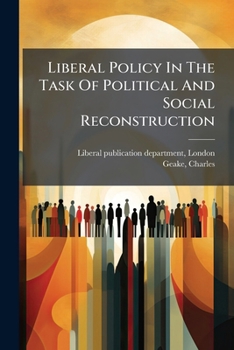Liberal Policy In The Task Of Political And Social Reconstruction
Liberal Policy In The Task Of Political And Social Reconstruction, originally published in 1918, offers a detailed exploration of liberal approaches to reshaping political and social structures in the aftermath of significant upheaval. Authored by the Liberal Publication Department, London, and edited by Charles Geake, this work provides valuable insights into the policy considerations and ideological underpinnings that guided liberal thinkers during a period of profound transformation.
The book examines the principles of liberalism as they apply to practical challenges of reconstruction, addressing key issues such as governance, social welfare, and individual rights. It serves as a vital historical document, shedding light on the intellectual debates and political strategies employed by liberals in the early 20th century. This edition makes available once again the important perspectives offered in "Liberal Policy In The Task Of Political And Social Reconstruction," appealing to scholars and anyone interested in the history of liberal thought and its application to real-world problems.
This work has been selected by scholars as being culturally important, and is part of the knowledge base of civilization as we know it. This work was reproduced from the original artifact, and remains as true to the original work as possible. Therefore, you will see the original copyright references, library stamps (as most of these works have been housed in our most important libraries around the world), and other notations in the work.
This work is in the public domain in the United States of America, and possibly other nations. Within the United States, you may freely copy and distribute this work, as no entity (individual or corporate) has a copyright on the body of the work.
As a reproduction of a historical artifact, this work may contain missing or blurred pages, poor pictures, errant marks, etc. Scholars believe, and we concur, that this work is important enough to be preserved, reproduced, and made generally available to the public. We appreciate your support of the preservation process, and thank you for being an important part of keeping this knowledge alive and relevant.





